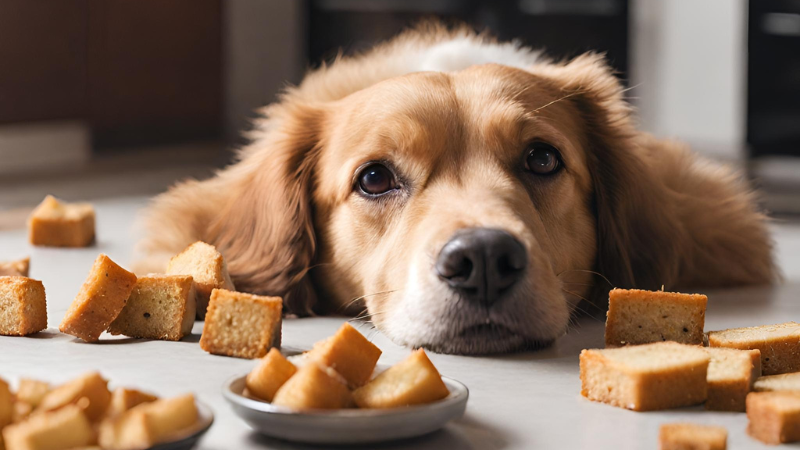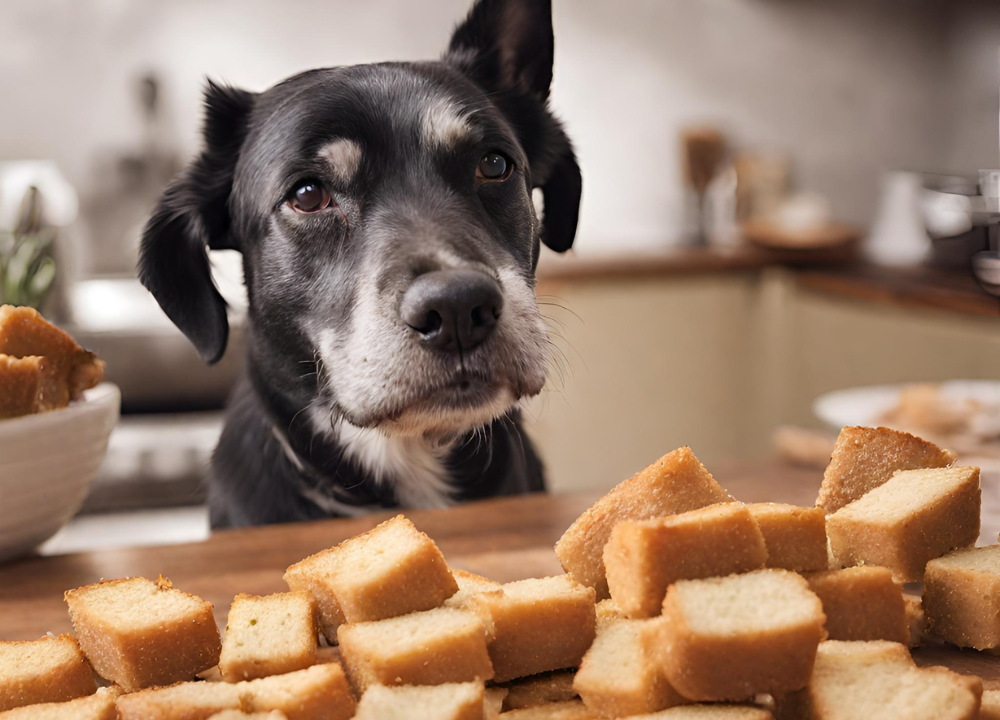No, dogs should not eat croutons as they can be harmful to their health. Croutons are a popular salad and soup topping that adds crunch and flavor.
However, when it comes to dogs, these crispy cubes of bread should be kept out of their reach. While croutons may seem harmless, they can actually pose a risk to your furry friend’s well-being. Dogs have different digestive systems than humans, and foods that may be safe for us can cause adverse effects in them.
Croutons are often seasoned with ingredients like garlic, onion, or spices that can be toxic to dogs. Furthermore, the crispy texture may be difficult for them to chew and digest, potentially leading to gastrointestinal problems. It’s always best to stick to a balanced canine diet approved by your veterinarian to ensure your dog’s safety and good health.
Understanding Croutons
In our culinary adventures, we often come across various toppings and garnishes that add flavor and crunch to our dishes. Among these, croutons are a popular choice, providing a satisfying bite to salads and soups. But have you ever wondered if your furry friend can enjoy this tasty treat with you? In this article, we will take a closer look at croutons, their types, and whether or not they are safe for dogs to consume.
What Are Croutons?
Croutons are small, crispy cubes or chunks of bread that have been toasted or fried to a golden brown. Traditionally made from stale bread, croutons are known for their irresistible texture and ability to add a delightful crunch to various dishes. You can commonly find them sprinkled on salads, soups, and even used as a tasty topping for casseroles.
Types Of Croutons
Croutons come in different shapes, sizes, and flavors, offering a wide range of options to suit different palates. If you are a crouton enthusiast, you may have encountered some of the following types:
| Type | Description |
|---|---|
| Classic Croutons | These croutons are made with plain, cubed bread and then toasted or fried. They have a neutral taste, allowing them to complement various dishes without overpowering their flavors. |
| Herbed Croutons | Herbed croutons are infused with various herbs like rosemary, thyme, or oregano during the toasting or frying process. This adds a burst of aromatic flavors that can take your salad or soup to the next level. |
| Cheesy Croutons | For cheese lovers, cheesy croutons are a dream come true. These delightful morsels are coated in grated or melted cheese before being toasted, resulting in a heavenly combination of crunch and cheesy goodness. |
| Garlic Croutons | If you enjoy the distinctive taste and aroma of garlic, garlic croutons are the perfect choice. These croutons are infused with garlic during the toasting or frying process, adding a zesty kick to your favorite dishes. |
While these variations can surely tantalize our taste buds, it’s essential to consider the safety and suitability of croutons for our four-legged companions. Let’s explore whether dogs can safely indulge in these tempting bread bites.
Feeding Croutons To Dogs
When it comes to feeding our furry friends, it’s important to prioritize their health and well-being. While dogs may have a reputation for being voracious eaters, not all human foods are safe for them. One such food item that often finds its way into our salads and soups is croutons. But can dogs safely eat croutons? Let’s take a closer look.

Potential Risks Of Feeding Croutons To Dogs
While croutons may seem harmless, they can pose potential risks to our canine companions. It’s important to note that croutons are essentially bread cubes that have been seasoned and toasted. While bread itself is not toxic to dogs, the additional ingredients and seasonings commonly found in croutons can be problematic.
One primary concern is the high sodium content in most croutons. Dogs have different nutritional needs than humans, and excessive sodium can lead to issues such as increased thirst, dehydration, and kidney problems.
Additionally, croutons often contain garlic and onion powder, both of which are considered toxic to dogs. These ingredients can cause damage to a dog’s red blood cells, leading to anemia and other serious health issues.
Furthermore, croutons are usually crunchy and may pose a choking hazard, especially for smaller breeds or dogs with dental issues. The hard texture can also irritate the digestive system, causing discomfort or even blockages.
Why Some Dogs May Enjoy Croutons
Despite the potential risks, some dogs may still exhibit an interest in croutons. Dogs are known for their indiscriminate eating habits, and the crunchy texture and savory flavors of croutons may be appealing to them.
However, it’s crucial to remember that just because a dog enjoys a certain food doesn’t mean it’s safe for them to consume. As responsible pet owners, it’s our duty to prioritize their health and make informed decisions about their diet.
If you’re looking for safe and healthy alternatives to croutons, there are plenty of dog-friendly treats available that offer similar textures and flavors without the potential risks. Always consult your veterinarian before introducing any new foods into your dog’s diet to ensure their safety and well-being.
Health Effects Of Croutons On Dogs
While croutons may seem harmless and even tempting to share with your furry companion, it’s important to be aware of the potential health effects they can have on dogs. Digestive issues, weight gain and obesity, as well as salt and seasoning problems are some of the concerns that can arise when dogs consume croutons. Let’s take a closer look at each of these areas.

Digestive Issues
Dogs have a different digestive system than humans, and their ability to break down certain foods differs as well. Croutons, which are typically made from bread, can be difficult for dogs to digest properly. The high carbohydrate content in croutons can cause digestive disturbances such as bloating, gas, and even diarrhea. This is especially true if your dog consumes a large amount of croutons or has a sensitive stomach. It’s always best to keep an eye on your dog’s digestive health and consult with a veterinarian if any issues arise.
Weight Gain And Obesity
One of the main concerns with feeding croutons to dogs is the potential for weight gain and obesity. Croutons are often high in calories and can quickly contribute to an imbalance in your dog’s diet. Just a handful of croutons can add up to a significant number of calories for a small-sized dog. Over time, regular consumption of croutons can lead to weight gain and obesity, which is linked to a wide range of health problems in dogs, including joint issues, diabetes, and cardiovascular diseases.
Salt And Seasoning Problems
Another aspect to consider when it comes to feeding dogs croutons is the salt and seasoning content. Many commercial croutons are loaded with salt and various seasonings, such as garlic, onion, or herbs. These seasonings can be harmful to dogs, as they have a different tolerance level for certain spices and flavors. Additionally, excessive salt intake can lead to dehydration and electrolyte imbalances in dogs. It’s important to remember that dogs have a more sensitive sense of taste than humans, and what may seem like a mild seasoning to us can be overpowering for them.
In conclusion, while it may be tempting to share your delicious croutons with your furry friend, it’s best to avoid feeding them to dogs. The potential digestive issues, weight gain, and salt and seasoning problems that can arise simply aren’t worth the risk to your dog’s health. Instead, focus on providing a well-balanced and appropriate diet for your beloved pet, which includes foods that are safe and specifically formulated for their nutritional needs.
Alternatives To Croutons For Dogs
Dogs love to eat and explore different flavors, but it’s essential to feed them foods that are safe and healthy. While croutons may seem like a harmless treat to share with your furry friend, they can pose a potential risk. Croutons are typically seasoned with various spices and can also be high in sodium, which is not suitable for our canine companions. Fortunately, there are plenty of delicious and dog-friendly alternatives to croutons that you can offer your beloved pet. In this article, we’ll explore safe and healthy treats for dogs as well as homemade dog-friendly crouton alternatives.
Safe And Healthy Treats For Dogs
When it comes to treating your dog, it’s essential to choose options that are not only delicious but also promote their overall health and well-being. Fortunately, there are plenty of safe and healthy alternatives to croutons that you can incorporate into your dog’s diet. Some of the best options include:
- Fresh fruits such as sliced apples, bananas, or blueberries. These fruits are packed with essential vitamins, minerals, and antioxidants that can support your dog’s immune system.
- Vegetables like baby carrots, cucumber slices, or green beans. These crunchy veggies can provide your dog with valuable nutrients and help keep their teeth clean.
- Lean meats such as cooked chicken or turkey. These protein-packed options can satisfy your dog’s carnivorous cravings without the added sodium and seasonings found in croutons.
- Plain and unsalted rice cakes or unsalted popcorn. These low-calorie snacks can be a great alternative to croutons and provide a satisfying crunch for your dog.
Homemade Dog-friendly Crouton Alternatives
If you enjoy making homemade treats for your dog, you can easily create dog-friendly crouton alternatives that are safe and delicious. Here are a few ideas:
- Bake sweet potato slices until they are crispy. Sweet potatoes are packed with essential vitamins and minerals and can be a great source of dietary fiber for your dog.
- Make homemade dog biscuits using ingredients like whole wheat flour, pumpkin puree, and peanut butter. These biscuits can be customized to suit your dog’s taste preferences while still being healthy and safe.
- Create crunchy kale chips by seasoning fresh kale leaves with a small amount of olive oil and baking them until crispy. Kale is a superfood that is rich in antioxidants and can be a great option for dogs in moderation.
Remember, before introducing any new treats into your dog’s diet, it’s essential to consult with your veterinarian. They can provide personalized advice based on your dog’s specific needs and dietary requirements.
Tips For Feeding Dogs Safely
Feeding your furry friend is not as simple as just giving them any food you have on hand. It’s essential to ensure that what they eat aligns with their dietary needs and does not pose any potential health risks. When it comes to feeding dogs, there are several important considerations that every responsible pet owner should keep in mind. Here are some tips to help you feed your dog safely and maintain their overall health and well-being.
Consulting With A Veterinarian
Before introducing any new food to your dog’s diet, it’s essential to consult with a veterinarian. A professional opinion will help you determine whether a specific food item, such as croutons, is safe for your furry companion. Although croutons seem harmless, they may contain seasonings, oils, or other ingredients that can be harmful to your dog’s digestive system or overall health. By discussing your dog’s dietary needs and potential risks with a veterinarian, you can make informed decisions about what is safe to include in their diet.
Monitoring Dietary Changes
When introducing any changes to your dog’s diet, it’s crucial to monitor their response and adjust accordingly. Dogs have unique dietary requirements, and sudden or excessive intake of a specific food item may lead to digestive issues, allergies, or other health concerns. If you decide to give your dog croutons as an occasional treat, ensure you observe how they react afterward. If any adverse symptoms appear, such as vomiting, diarrhea, or changes in behavior, it’s wise to discontinue the treat and consult your veterinarian.
Ensuring A Balanced Diet For Dogs
One of the key factors in maintaining a dog’s health is providing a balanced diet. While it may be tempting to offer them a variety of foods, it’s important to ensure that their overall nutritional needs are met. Dogs require a proper balance of protein, carbohydrates, fats, vitamins, and minerals to thrive. Treats like croutons should be given sparingly and in moderation. It is crucial to avoid replacing regular meals with treats or introducing any unbalanced snacks that may contribute to deficiencies or imbalances in their diet.
By following these important tips, you can feed your dog safely and help maintain their overall well-being. Remember that every dog is unique, and their dietary needs may differ based on factors such as age, breed, and health conditions. Your veterinarian is the best resource to guide you in providing the most suitable diet for your furry friend.
Frequently Asked Questions Of Can Dogs Safely Eat Croutons
What Happens If My Dog Eats A Garlic Crouton?
If your dog eats a garlic crouton, it can lead to digestive upset and possible anemia due to the toxic properties of garlic in dogs. Contact your veterinarian for advice and monitor your dog for any symptoms or changes in behavior.
Will A Small Amount Of Onion Hurt My Dog?
Small amounts of onion can be harmful to dogs. Onions contain a compound that damages their red blood cells, leading to anemia. It’s best to avoid feeding any onion to your furry friend to keep them safe.
Is Garlic Toxic For Dogs?
Garlic is toxic to dogs and can cause various health issues, such as anemia, gastrointestinal upset, and damage to red blood cells. It’s best to avoid feeding your dog any garlic-containing products to ensure their well-being.
What If My Dog Ate A Small Piece Of Garlic?
If your dog ate a small piece of garlic, it’s best to monitor them closely for any signs of distress or illness. Garlic can be toxic to dogs and may cause symptoms like vomiting or diarrhea. Contact your veterinarian immediately for further guidance and assistance.
Conclusion
To sum up, while croutons may seem like harmless treats for dogs, it is important to remember that they are not an ideal choice for their diet. These crispy cubes can be high in sodium, artificial additives, and unhealthy fats, which can pose potential risks to your furry friend’s health.
Instead, it is always recommended to opt for safe and nutritious alternatives that are specifically formulated for dogs. Prioritizing your pet’s well-being entails making informed choices about their dietary needs.







